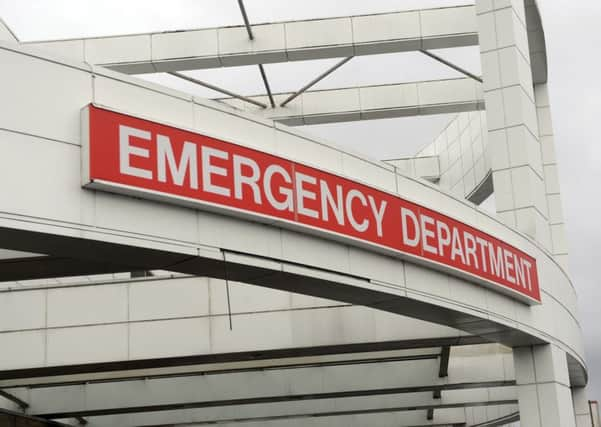Stark warning over affects of cuts on A&E patient safety


Hospital staff increasingly feel pressured into emphasising “only good news” and are reluctant to raise concerns amid fears they may face repercussions from NHS managers, MSPs have been told.
The Royal College of Emergency Medicine (RCEM) in Scotland says “firefighting has become the new norm” in emergency departments and revealed that some clinical governance systems have been axed because the £7,000 cost is prohibitive.
Advertisement
Hide AdAdvertisement
Hide AdThe British Medical Association (BMA) says that staff shortages in A&E meant doctors cannot be “consistently confident about the safety and quality of the service” being provided to patients.
The situation has worsened recently in Scotland’s emergency department, with hundreds of patients left waiting for eight hours or more amid increasing pressure, the latest official figures show.
Health secretary Shona Robison ordered a probe into A&E waiting times at St John’s hospital in Livingston on Friday when it emerged these had been wrongly recorded by under pressure staff.
But concerns over the clinical governance in hospitals – ensuring that patients are safe and risks are managed – have been spelled out to MSPs ahead of an evidence session this week.
The RCEM warns that emergency departments do not have a clear framework, which is “necessary to drive quality of care and decision making.”
It adds: “In some cases, clinical governance departments have been closed and the work distributed among other hospital teams. This has resulted in the delivery of much smaller and fewer patient safety programmes.
“We are also aware of some CG software support contracts not being renewed, with the c.£7000 a year cost being cited as prohibitive when queried by the suppliers.”
One doctor even told college chiefs there is “little coordinated, recognisable work in this area” across the health board he worked for.
Advertisement
Hide AdAdvertisement
Hide AdHe added: “We have become reactive and respond only to serious incidents – the feel is that ‘firefighting’ has become the new norm.”
The NHS in Scotland is still suffering from a “blame culture” that remains prevalent, the RCEM submission adds.
The British Medical Association warns that NHS staff may be reluctant to flag up concerns.
“The pressure for ‘only good news’ to be escalated is worryingly prevalent and may mean that areas of concern are not always raised because of a perception they will not be well received by senior management,” it states in a submission. Asked if services are safe, effective and evidence-based, the BMA states: “The picture is mixed.”
Overnight requests for “an extra pair of hands” in A&E wards often go unanswered, according to the BMA, and although staff are asked to report this the situation can persist “over long periods of time”. “This experience of being routinely short staffed means that the medical workforce is not able to be consistently confident about the safety and quality of the service which they are able to offer,” the BMA warns.
“This undermines morale and is one of the reasons staff leave. Increasing staff numbers is meant to help, but if it’s the experienced staff who leave, there is still a deficit.”
It adds: “Inevitably this will have an impact not only on patient safety, but on staff welfare and wellbeing.”
The situation in Scotland’s emergency departments is generally better than elsewhere in the UK. Patients south of the border are left waiting longer than the standard four-hour standard for treatment. But the latest figures from NHS Scotland reveal almost 800 people faced the lengthy delays in September, an increase of 42 per cent on last year. The rise came even though the number of patients who needed emergency hospital treatment actually fell.
Advertisement
Hide AdAdvertisement
Hide AdProfessor Jason Leitch, the Scottish Government’s national clinical director for healthcare quality and strategy, insisted safety for patients is the “top priority.”
He added: ““Scotland’s ED (emergency department) performance is consistently above that in the other UK countries despite increasing demand in part because of the reduction in delayed discharge as a result of health and social care integration.”